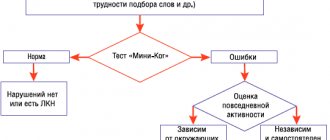The feeling of anxiety is a genetically inherent feature of a person: new activities, changes in personal life, changes in work, in the family, etc., should cause mild anxiety.
The expression “only a fool is not afraid” has lost its relevance in our time, because for many people panic anxiety appears out of nowhere, then the person simply overwhelms himself, and far-fetched fears increase like a snowball.
With the accelerating pace of life, constant feelings of anxiety, restlessness and the inability to relax have become commonplace conditions.
Neurosis, according to classical Russian taxonomy, is part of anxiety disorders; it is a human condition that is caused by long-term depression, severe stress, constant anxiety, and against the background of all this, autonomic disorders appear in the human body.
It is important to understand that neurosis can also arise against the background of the inability to relax; workaholics become its “target” in the first place.
It's okay, I'm just worried and a little scared
One of the preceding stages of the appearance of neurosis can be the unreasonable occurrence of anxiety and worry.
A feeling of anxiety is a tendency to experience a situation, to be constantly worried. Depending on the character of the person, his temperament and sensitivity to stressful situations, this condition can manifest itself in different ways. But it is important to note that unreasonable fears, anxiety and worry, as a pre-stage of neurosis, most often appear in tandem with stress and depression.
Anxiety, as a natural feeling of a situation, not in a hyper form, is useful for a person. In most cases, this condition helps to adapt to new circumstances. A person, feeling anxious and worried about the outcome of a particular situation, prepares as much as possible, finds the most suitable solutions and solves problems.
But as soon as this form becomes permanent, chronic, problems begin in a person’s life. Everyday existence turns into hard labor, because everything, even the little things, scares you.
In the future, this leads to neurosis, and sometimes to phobia, and generalized anxiety disorder (GAD) develops.
There is no clear boundary of transition from one state to another; it is impossible to predict when and how anxiety and a feeling of fear will turn into neurosis, and that in turn into an anxiety disorder.
But there are certain symptoms of anxiety that appear constantly without any significant reason:
- sweating;
- hot flashes, chills, trembling throughout the body, tremors in certain parts of the body, numbness, severe muscle tone;
- chest pain, burning stomach (abdominal distress);
- fainting, dizziness, fears (of death, madness, murder, loss of control);
- irritability, a person is constantly “on edge”, nervousness;
- sleep disturbance;
- any joke can cause fear or aggression.
Hyperventilation during anxiety
Yoga classes are useful for people who often experience anxiety. They promote physical and mental relaxation, smooth breathing and help overcome negative emotions. The exercise is designed to strengthen and relax the muscles of the chest and abdomen and restore the disrupted flow of vital energy (prana). At each stage, take five breaths.
- Kneel down, place one hand on your stomach, the other on your thigh. Feel how the abdominal wall rises when you inhale, and how it draws in when you exhale slowly.
- Place your palms on either side of your chest. When breathing, raise and lower your chest, while exhaling, pressing on it with your hands, squeezing out the air.
- Tighten your abdominal muscles. As you inhale, lift your shoulders and upper chest and lower them as you exhale, while relaxing your abdominal muscles
No matter how the feeling of anxiety manifests itself, it exhausts and deprives one of strength; eventually physical health may suffer seriously. It is necessary to find ways to combat the main cause of the disease. Consult a specialist. How to avoid feelings of anxiety?
In a state of anxiety and especially during outbreaks of panic fear, breathing quickens and becomes shallow, and the ratio of oxygen and carbon dioxide in the body is disturbed. To eliminate overoxygenation, or hyperventilation, sit with your hand on your upper abdomen and inhale and exhale so that your hand rises as you inhale. This helps to breathe slowly and deeply.
{banner_ads_body1}
Cognitive therapy. Practicing affirmations will help reprogram your thoughts so that the emphasis falls on the positive aspects of life and personality, rather than the negative ones.
Write short phrases that suit your occasion. For example, “I am prepared for this job” if you have an interview with a possible employer.
It can be helpful to repeat these phrases out loud or write them out several times. This type of psychological exercise is part of cognitive therapy, aimed at changing natural or instinctive reactions without trying to understand their essence.
The doctor can direct your thoughts to search for a positive explanation for the actions of certain people: for example, a friend did not pay attention to you in the store, not because she does not like you, but simply did not see you, thinking about something.
Once you understand the essence of such exercises, you will be able to perform them yourself. You will learn to adequately perceive negative influences and replace them with more positive and realistic ones.
The main symptom of an anxiety disorder is the feeling of fear and worry that a person often experiences. This condition usually meets three criteria.
The first is a long-term illness, when complaints exist for more than half a year and if the disease itself proceeds either monotonously or progresses, without prosperous periods and “bright intervals”.
The second is the all-encompassing nature of the feeling of fear and anxiety. A person experiences discomfort almost all the time. Its components: groundless misgivings, tied or not tied to a specific object, inability to relax, constant tension, expectation of trouble, unmotivated anxiety, and sometimes panic fear.
Anxiety neurosis - the first steps to madness
Anxiety neurosis can manifest itself differently in different people, but there are main symptoms and features of the manifestation of this condition:
- aggressiveness, loss of strength, complete despair, anxiety even in a minor stressful situation;
- touchiness, irritability, excessive vulnerability and tearfulness;
- fixation on one unpleasant situation;
- fatigue, low performance, decreased attention and memory;
- sleep disturbances: shallow, there is no lightness in the body and in the head after waking up, even the slightest overexcitement deprives one of sleep, and in the morning hours, on the contrary, there is increased drowsiness;
- autonomic disorders: sweating, pressure surges (mostly downward), disruption of the gastrointestinal tract, rapid heartbeat;
- a person during a period of neurosis reacts negatively, sometimes even aggressively, to changes in the environment: a decrease in temperature or a sharp increase, bright light, loud sounds, etc.
But it should be noted that neurosis can manifest itself both openly in a person and hidden. There are often cases when a trauma or situation preceding a neurotic failure occurred a long time ago, and the very fact of the appearance of an anxiety disorder has only just taken shape. The nature of the disease itself and its form depends on environmental factors and the person’s personality.
If you have no interest in work, what should you do?
If you have no interest in activity at all, you can’t find it, and you don’t want to work at all, you are probably a dependent person, or simply parasitic, in connection with some benefits and personal attitudes or beliefs.
Usually a person has an inherent interest in activity, and anxiety in this case is invested in any suitable activity. For example, if you are a housewife who has not worked for a long time, you will invest your anxious energy in cleaning, supervising and controlling the servants or your own children. Yes, so zealously that your children will be infected by your ways of dealing with anxiety and will learn from you.
If there is no interest in work, in case of depression, when the anxiety that has returned has already hit your psyche and brought it into a deplorable state: bad mood, poor sleep, nothing makes you happy, and this state lasts, you will need the help of a psychotherapist.
If you have no interest in work, but want to be “like everyone else,” it’s better to go to a psychologist, look together for your ways to deal with anxiety, remember your interests in work and activities that are now dormant, forgotten and abandoned.
A psychologist-psychotherapist will help you return to the activity that suits you best, which you once studied, and, for personal reasons, failed and became disillusioned with your profession, or in general, with activity as such.
GAD - fear of everything, always and everywhere
There is such a concept as generalized anxiety disorder (GAD) - this is one of the forms of anxiety disorders, with one caveat - the duration of this kind of disorder is measured in years, and affects absolutely all areas of a person’s life.
We can conclude that it is precisely this monotonous state of “I’m afraid of everything, I’m afraid always and constantly” that leads to a complex, painful life.
Even ordinary cleaning of the house, not done according to schedule, upsets a person, going to the store for a necessary thing that was not there, calling a child who did not answer on time, but in his thoughts “they stole, killed”, and many other reasons why There is no need to worry, but there is anxiety.
And all this is generalized anxiety disorder (also sometimes called phobic anxiety disorder).
And then there’s the depression...
Anxiety-depressive disorder, as a form of neurosis, according to experts, by 2020 will take second place after coronary heart disease among disorders that lead to disability.
The states of chronic anxiety and depression are similar, which is why the concept of TDR appeared as a kind of transitional form. The symptoms of the disorder are as follows:
- mood swings;
- sleep disturbances for a long period;
- anxiety, fears for yourself and loved ones;
- apathy, insomnia;
- low performance, decreased attention and memory, inability to learn new material.
There are also vegetative changes: increased heartbeat, increased sweating, hot flashes or, conversely, chills, pain in the solar plexus, gastrointestinal disorders (abdominal pain, constipation, diarrhea), muscle pain and more.
Anxiety-depressive syndrome is characterized by the presence of several of the above symptoms over several months.
Symptoms of anxiety
Vegetative (somatic) signs are physical, the most common of them are:
- dizziness;
- rapid heartbeat or, conversely, freezing of the rhythm;
- trembling of hands and feet;
- "bear" disease;
- sweating;
- muscle spasms - usually in the collar area;
- general weakness;
- pain in the heart area;
- unpleasant stench from the mouth;
- being thrown into heat or cold;
- lump in throat, excessive dry mouth;
- increase in pressure and temperature;
- lack of air.
The mental symptoms are:
- depressed mood;
- concern
- fear of death;
- absent-mindedness;
- excitability or depression;
- hypochondria;
- insomnia;
- fast fatiguability;
- feeling overwhelmed;
- emotional stress, etc.
This cannot be done harmlessly for the body - there is a risk of developing a psychosomatic illness.
Causes of anxiety
The causes of anxiety disorders cannot be divided into one clearly defined group, because each person reacts to one or another circumstance in life differently.
For example, a certain decline in the exchange rate of the currency or ruble may not worry a person during this period of life, but problems at school or college with peers, colleagues or relatives can lead to neurosis, depression and stress.
Experts identify some causes and factors that can cause anxious personality disorder:
- dysfunctional family, depression and stress suffered in childhood;
- problematic family life or the inability to arrange it in time;
- predisposition;
- female sex - unfortunately, many representatives of the fair sex are already by nature predisposed to excessively “take everything to heart”;
- Experts have also identified some dependence on the constitutional composition of the human body: obese people are less predisposed to the appearance of neuroses and other mental disorders;
- setting the wrong goals in life, or rather exaggerating them, already the initial failure leads to unnecessary worries, and the ever-accelerating pace of modern life only adds fuel to the fire.
What do all these factors have in common? The importance and significance of a psychotraumatic factor in your life. And as a result, a feeling of anxiety and fear arises, which from a normal natural form can develop into a hypertrophied, causeless one.
Features of anxiety “for no reason” - constant worry about something that even theoretically cannot happen. Sometimes, a person simply saw a similar situation on TV, with neighbors or relatives, and the slightest reminder of any similar facts already raises the alarm “what if this happens now.”
But it must be said that all similar factors only predispose, and the rest of the twisting occurs in a person’s thoughts.
Depression
A mental disorder in which a person cannot enjoy life, enjoy communicating with loved ones, does not want to live, is called depression and can last up to 8 months. Many people are at risk of developing this disorder if they have:
- unpleasant events - loss of loved ones, divorce, problems at work, absence of friends and family, financial problems, poor health or stress;
- psychological trauma;
- relatives suffering from depression;
- traumas received in childhood;
- self-prescribed medications taken;
- drug use (alcohol and amphetamines);
- previous head injury;
- various episodes of depression;
- chronic conditions (diabetes, chronic lung disease and cardiovascular disease).
A person suffering from a depressive disorder is pessimistic, aggressive, anxious, experiences constant feelings of guilt, is unable to concentrate, has poor appetite, insomnia, and has thoughts of suicide.
Prolonged undiagnosed depression can lead a person to use alcohol or other types of substances, which will significantly affect his health, life and the lives of his loved ones.
Complex of manifestations
Symptoms of anxiety disorders are divided into two groups:
- Somatic symptoms . Characterized by pain, deterioration of health: headaches, sleep disturbances, darkening of the eyes, sweating, frequent and painful urination. We can say that a person feels changes on the physical level, and this further aggravates the anxious state.
- Mental symptoms : emotional stress, a person’s inability to relax, fixation on the situation, constantly turning it over, forgetfulness, inability to concentrate on something, inability to remember new information, irritability and aggression.
The transition of all of the above symptoms into a chronic form leads to such unpleasant consequences as neurosis, chronic depression and stress. Living in a gray, scary world, where there is no joy, no laughter, no creativity, no love, no sex, no friendship, no delicious dinner or breakfast... all these are the consequences of untreated mental disorders.
Therapy for panic disorders
• Alleviating the patient's anxiety and improving his quality of life.
• Mobilization of the patient's adaptive mechanisms to combat stress.
• Preventing the transition of adaptation disorder to a chronic anxiety state.
Basic principles of therapy for panic disorders.
• Individuality - therapy not for the disease, but for the patient.
• Validity—use of treatments that are most appropriate for a particular situation.
• Complexity - a combination of various methods of therapy.
Basic methods of treating panic disorders
• pedagogical, didactic methods;
• literature for patients;
• mass media.
• biofeedback;
• other types of psychotherapy.
• selective monoamine oxidase inhibitors;
• serotonin reuptake inhibitors;
• blockers of histamine H1 receptors;
When prescribing anxiolytic drugs, it is necessary to distinguish a “normal” anxiety state from a clinically significant one, which depends on the severity of the emotional reaction, the level of adaptation, as well as the degree of correspondence between the significance of the stress stimulus and the response.
Help needed: diagnostics
Diagnosis should only be made by a specialist. The symptoms show that all anxiety states are intertwined; there are no clear objective indicators that can clearly and accurately separate one form of anxiety disorder from another.
Diagnosis by a specialist is made using color techniques and conversation. A simple conversation, a leisurely dialogue, which is a “secret” survey, will help reveal the true state of a person’s psyche. The treatment stage begins only after the correct diagnosis has been made.
Do you suspect the development of anxiety disorders? You need to contact your local physician. This is the first stage.
Then, based on all the symptoms, the therapist will tell you whether you need to see a psychotherapist or not.
When searching for a doctor, you need to take into account several rules: do not rush into dubious advertisements; it is better if the psychotherapist has recommendations and experience; During the sessions it should be comfortable; if the patient feels constrained, there will be no result.
All interventions should be made only depending on the degree and severity of the disorder. It is important to note that treatment is tailored only individually. There are techniques and general recommendations, but the effectiveness of treatment is determined only by the correct approach to each patient separately.
How to overcome fears, worries and anxiety
To get rid of fear, anxiety and anxiety today there are two main approaches.
Psychotherapy sessions
Psychotherapy sessions, alternative name for CBT (cognitive behavioral therapy). During such therapy, the causes of mental vegetative and somatic disorders are identified.
Another important goal is a call for proper stress relief and learning to relax. During sessions, a person can change his stereotypical thinking; during a calm conversation in a conducive environment, the patient does not fear anything, which is why he opens up completely: calmness, a conversation that helps to understand the origins of his behavior, realize them, and accept them.
Next, a person learns how to deal with anxiety and stress, get rid of unreasonable panic, and learns to live. The psychotherapist helps the patient accept himself, understand that everything is fine with him and his environment, that he has nothing to be afraid of.
It is important to note that CBT is carried out both on an individual basis and in groups. This depends on the severity of the disorder, as well as the patient's willingness to be treated in one way or another.
It is important that a person must consciously come to a psychotherapist; he must at least understand that this is necessary. Forcibly pushing him into the office, and for longer also forcing him to talk - such methods will not only not give the desired result, but will also aggravate the situation.
In combination with psychotherapy sessions, a massage session and other physical procedures can be performed.
Medicines for fear and anxiety - a double-edged sword
Sometimes the use of medications is practiced - these are antidepressants, sedatives, beta blockers. But it is important to understand that medications will not cure anxiety disorders, nor will they be a panacea for getting rid of mental disorders.
The purpose of the medication method is completely different; drugs help you keep yourself under control and make it easier to bear the severity of the situation.
And they are not prescribed in 100% of cases; the psychotherapist looks at the course of the disorder, the degree and severity, and already determines whether there is a need for such medications or not.
In advanced cases, strong and fast-acting medications are prescribed to obtain the fastest effect in order to relieve an anxiety attack.
Specialists tell their patients what these medications are, why they are needed, and what course is needed in this particular case. It is important to convey to the patient that once you have started taking medications, you should not suddenly stop taking them.
The combination of two methods gives results much faster. It is important to consider that a person should not be left alone: family, his relatives can provide irreplaceable support and thereby push him towards recovery. How to cope with anxiety and worry - video tips:
Alginophobia: treatment
Panic attacks. Treatment.
In the complex treatment of anxiety disorders, including panic attacks, tranquilizers are always used. These may be: alprozolam, clorazepate, diazepam, phenazepam, clonazepam.
To relieve panic attacks, parenteral administration of clonazepam is preferable. Tricyclic antidepressants are also commonly used - imipramine, clomipramine, doxepin, amitriptyline.
They are especially effective when administered intravenously.
Isantidepressants of other groups are often effective: mianerin, trazodone, and paroxetine.
Typically, carbamazepine in combination with individual nootropics, such as Pantogam and Phenibut, is effective in combating panic fears.
In combination with antidepressants, it is advisable to use beta-blockers - Razicor, propanolol, etc.
In the fight against panic attacks, different methods of psychotherapy are always effective. Preference is given to cognitive-behavioral and short-term psychodynamic.
The duration of treatment is from 6 to 12 months. Shorter courses do not lead to reliable results.
During the treatment of panic attacks, the intensity of fear and its vegetative-somatic manifestations decreases, the frequency of panic attacks decreases, the anxiety of anticipating panic attacks goes away, and the intensity of comorbid disorders, in particular depression, decreases.
Emergency situation - what to do?
In emergency cases, an attack of panic and anxiety can be relieved with medication, and also only by a specialist; if he is not present at the time of the peak of the attack, it is important to first call medical help, and then try with all your might not to worsen the situation.
But this does not mean that you have to run and shout “help, help.” No! You need to show calm by all appearances; if there is a possibility that a person could cause injury, leave immediately.
If not, try to talk in a calm voice and support the person with the phrases “I believe in you. WE are together, WE will get through this." Avoid saying “I feel it too”, anxiety and panic are individual feelings and everyone feels them differently.
Don't make it worse
Most often, if a person applies at an early stage of the development of the disorder, doctors recommend several simple preventive measures after the situation has resolved:
- Healthy lifestyle.
- Getting enough sleep, proper quality sleep is the key to peace of mind, the key to overall health of the whole body.
- Eat properly . Varied, high-quality, beautiful (and this is also important) food can lift your spirits. Who would refuse a freshly baked, fragrant, hot apple pie with a small scoop of vanilla ice cream? Just these words make your soul feel warm, let alone the meal itself.
- Find a hobby , something you like, perhaps change jobs. This is a kind of relaxation, relaxation.
- Learn to relax and deal with stress , and for this, with the help of a psychotherapist or independently study relaxation methods: breathing exercises, using special points on the body, when pressed, relaxation occurs, listening to your favorite audiobook or watching a good (!) movie.
It is important to note that doctors and specialists use forced rehabilitation only in very severe cases. Treatment in the early stages, when almost all people tell themselves “it will go away on its own,” is much faster and of better quality.
Only the person himself can come and say “I need help,” no one can force him. That is why it is worth thinking about your health, not letting everything take its course and contacting a specialist.
Why stress occurs
The high-quality energy tone in the human body depends on how harmoniously the gas and brake pedals work: the sympathetic and parasympathetic systems.
When we solve a problem under a deadline, have an emotional conversation, watch negative news and worry about what is happening, run a marathon or “run away from a predator,” the sympathetic part of the autonomic nervous system is working. Stress is its extreme level. Even if a person physically does nothing, but sits in fear, sympathy is mobilized beyond measure. When the goal is achieved, the brain should put us into “parasympathetic inhibition” mode. When the parasympathetic system works, the body is restored. With moderate activation of this part of the autonomic nervous system, we are relaxed, with stronger activation, we begin to doze off, and with maximum activity, we fall asleep deeply. Only during sleep does a person restore the harmonious functioning of the body as much as possible and accumulate energy for the next day.
If during the day the sympathetic system is working at its limit, then it is extremely necessary to “slow down” by activating the parasympathetic system. When the brain receives information that it is time to relax, a special neurotransmitter is released that is responsible for parasympathetic inhibition - acetylcholine. Then the entire body system returns to normal.
If before going to bed a person actively thinks, remembers the events of the past day, or worries about what will happen tomorrow, he is still under emotional stress. Inhibition does not occur, the nervous system is exhausted.











